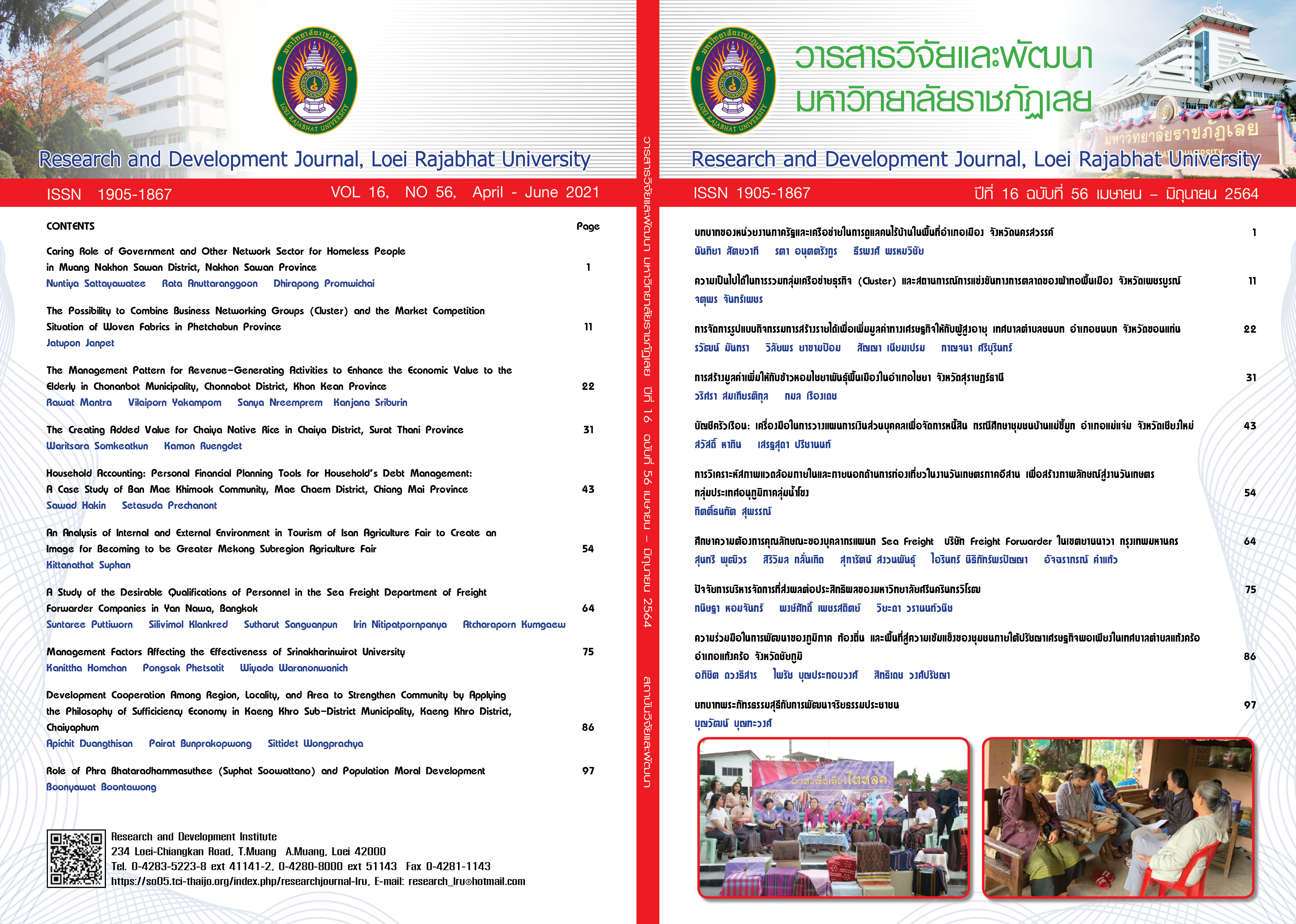Role of Phra Bhataradhammasuthee (Suphat Soowattano) and Population Moral Development
Keywords:
role, moral developmentAbstract
The objectives of the research were 1) to study the role of Phra Bhattaradhammasuthee (Suphat Suvaddhano), Srisuddhavasa Temple, Kut Pong sub-district, Muang Loei district, Loei province, on Morality Development for People, and 2) to evaluate morality application of lay persons around Srisuddhavasa Temple in their living life. The qualitative research methodology was employed and the data were collected with in-depth interviews from sixteen key informants, purposively selected from monks and novices in Srisuddhavasa Temple, lay persons around the temple and the Buddhist academicians. The research instrument used for data collection was the in-depth interview; the data analysis was engaged in the methods of induction and description.
The findings of the research were as follows: The general roles and duties of Phra Bhaddaradhammasuthee (Suphat Suvatthano) were found as follows: In the temple, he was an existing abbot. Besides, there were three educational institutions within the temple’s vicinity, he was also the director of Luang Poo Srichan Vannabho Charity School, the director of Srichan Vidhaya School, an ecclesiastical secondary school in Loei province, and a former vice rector of Mahamakut Buddhist University, Srilanchang Campus, an ecclesiastical university in Loei province. To provide monks, novices and commoners with both worldly and religious studies, there were several centers of morality development within Srisuddhavasa Temple like Buddhism Study Center on Sunday, which was established to provide youth with Buddhism study, Meditation Center on Sunday, which was established to train the Buddhists on meditation and mind development monthly, and Loei Preacher Monk Center. Srisuddhavasa Temple was generally regarded as a center for the Buddhists in Loei and neighboring provinces.
Another role of Phra Bhaddaradhammasuthee (Suphat Suvatthano) was to propagate Buddhism outside the temple or to receive an invitation for any religious rite so as to develop commoners with the Buddhist principles and to have them understand the Buddha’s right teachings. That was, they were taught to be persons with honesty, no taking advantage of other persons, and no abuse of benefits, which caused damages and harms to one’s own self and others. His teaching was aimed at a right living for listeners.
References
นิธิ เอียวศรีวงศ์. (2537). มองอนาคต (พิมพ์ครั้งที่ 5). กรุงเทพฯ: มูลนิธิภูมิปัญญา.
บุษบาภรณ์ สิงหอัศวรัตน์. (2555). การวิเคราะห์หลักสัมมาทิฏฐิในพระพุทธศาสนาเพื่อการพัฒนาชีวิต (สารนิพนธ์พุทธศาสตรดุษฏีบัณฑิต). มหาวิทยาลัยมหาจุฬาลงกรณราชวิทยาลัย, พระนครศรีอยุธยา.
พระธรรมปิฎก (ป.อ. ปยุตโต). (2547). สู่การศึกษาแนวพุทธ. กรุงเทพฯ: สหธรรมิก.
พระพรหมคุณาภรณ์ (ป.อ. ปยุตฺโต). (2548). วิสัยธรรมเพื่อเบิกนำวิสัยทัศน์. กรุงเทพฯ: พิมพ์สวย.
พระพรหมคุณาภรณ์ (ป.อ. ปยุตฺโต). (2550). ความสำคัญของพระพุทธศาสนาในฐานะศาสนาประจำชาติ (พิมพ์ครั้งที่ 11). กรุงเทพฯ: สหธรรมิก.
พระมหากิตติ สุจิตฺโต (สร้อยมาลา). (2556). บทบาทของพระสงฆ์ในการพัฒนาชุมชนในทัศนะของประชาชนในเขตอำเภอมะขาม จังหวัดจันทบุรี (วิทยานิพนธ์ศิลปศาสตรมหาบัณฑิต). มหาวิทยาลัยราชภัฏรำไพพรรณี, จันทบุรี.
พระมหาเกริกชัย เริญไธสง. (2557). แนวทางการพัฒนาวัดตามมาตรฐานของสำนักงานพระพุทธศาสนาแห่งชาติในจังหวัดนครปฐม (วิทยานิพนธ์ศึกษาศาสตรมหาบัณฑิต). มหาวิทยาลัยศิลปากร, นครปฐม.
สมเด็จพระพุทธโฆษาจารย์ (ป.อ. ปยุตฺโต). (2562). พุทธธรรม (ฉบับเดิม) (พิมพ์ครั้งที่ 37). กรุงเทพฯ: ธรรมดาเพรส.
สมภาร พรมทา.(2546). มนุษย์กับศาสนา. กรุงเทพฯ: สำนักพิมพ์ศยาม.
สุภีร์ ทุมทอง. (2560). อริยมรรคมีองค์ 8. นนทบุรี: ห้างหุ้นส่วนจำกัดภาพพิมพ์.
สุรพล ไกรสราวุฒิ. (2550). ความพอเพียงคือทางรอดของมนุษย์และสังคม. กรุงเทพฯ: จุฬาลงกรณ์มหาวิทยาลัย.
อานนตรี ประสมสุข.(2561).การประยุกต์ใช้หลักปรัชญาเศรษฐกิจพอเพียงตามหลักพระพุทธศาสนาของปราชญ์ชาวบ้าน ตำบลขวาว อำเภอเสลภูมิ จังหวัดร้อยเอ็ด (วิทยานิพนธ์พุทธศาสตรมหาบัณฑิต). มหาวิทยาลัยมหาจุฬาลงกรณราชวิทยาลัย, ร้อยเอ็ด.
Downloads
Published
How to Cite
Issue
Section
License
ข้อความที่ปรากฎในวารสารฉบับนี้เป็นความคิดเห็นของผู้เขียนแต่ละท่าน สถาบันวิจัยและพัฒนา มหาวิทยาลัยราชภัฏเลย และกองบรรณาธิการ ไม่จำเป็นต้องเห็นด้วยและไม่มีส่วนรับผิดชอบใดๆ
สถาบันวิจัยและพัฒนา มหาวิทยาลัยราชภัฏเลย ขอให้ผู้อ่านอ้างอิงในกรณีที่ท่านคัดลอกเนื้อหาบทความในวารสารฉบับนี้






